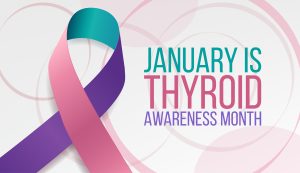 January is Thyroid Awareness Month.
January is Thyroid Awareness Month.
Thyroid disease is a medical condition that keeps your thyroid from making the right amount of hormones. The thyroid is a small, butterfly-shaped gland at the front of the neck under your skin. As a part of the body’s endocrine system, it controls many of your body’s important functions by producing and releasing thyroid hormones and controlling the speed of your metabolism.
There are two main types of thyroid disease, hypothyroidism (underactive thyroid) and hyperthyroidism (overactive thyroid). They each have several conditions that can cause them.
Conditions that can cause hypothyroidism include:
- Hashimoto’s disease – this is a lifelong autoimmune condition that can cause hypothyroidism. It is the most common cause of hypothyroidism in countries with widely available iodized salt and other iodine-enriched foods.
- Iodine deficiency – the thyroid needs iodine to make the thyroid hormone, so a lack of the mineral in your diet can lead to hypothyroidism. It is the most common cause of hypothyroidism in countries that don’t have iodized salt widely available. It often causes goiters also known as an enlarged thyroid.
- Congenital hypothyroidism – sometimes, babies are born with a missing or underactive thyroid. “Congenital” means present from birth. About one in every 2,000 to 4,000 babies have congenital hypothyroidism.
Conditions that can cause hyperthyroidism include:
- Graves’ disease – this is a chronic autoimmune condition that causes an overactive thyroid. It is the most common cause of hyperthyroidism.
- Thyroid nodules – these are abnormal lumps on your thyroid gland. If the nodules are hyper-functioning, they can lead to hyperthyroidism.
- Excessive iodine – when you have too much iodine in your body, your thyroid makes more thyroid hormones than you need. You may develop excessive iodine by taking certain medications.
Some conditions can cause both hypothyroidism and hyperthyroidism at different times, including:
- Thyroiditis – which is the inflammation of the thyroid gland. It typically causes temporary hyperthyroidism at first and then temporary or chronic hypothyroidism.
- Postpartum thyroiditis – this is a relatively rare condition that affects some birthing parents after pregnancy. An estimated 5% of people may experience this after giving birth. It typically causes hyperthyroidism first, followed by hypothyroidism. It is usually temporary.
There are a variety of thyroid disease symptoms. Unfortunately, symptoms of a thyroid condition are often similar to the signs of other medical conditions and stages of life, making it difficult to know if the symptoms are related to a thyroid issue or something else.
Symptoms of hypothyroidism include:
- Slower-than-usual heart rate
- Fatigue
- Unexplained weight gain
- Feeling sensitive to the cold
- Dry skin and dry coarse hair
- Depression
- Heavy menstrual periods
Symptoms of hyperthyroidism include:
- Faster-than-usual heart rate
- Difficulty sleeping
- Unexplained weight loss
- Feeling sensitive to the heat
- Clammy or sweaty skin
- Feeling anxious, irritable, or nervous
- Irregular menstrual cycles or lack of periods
Many factors can put you at a higher risk of developing a thyroid condition, including:
- Being assigned female at birth (AFAB). People AFAB are five to eight times more likely to have a thyroid condition than people assigned male at birth (AMAB)
- Have a family history of thyroid disease
- Have Turner syndrome
- Take a medication that is high in iodine
- Live in a country or area that doesn’t have iodized table salt, which can lead to iodine deficiency
- Are older than 60 years of age, especially if you are AFAB
- Have received radiation therapy to your head and/or neck
Having an autoimmune disease also increases your risk, especially if you have:
- Pernicious anemia
- Type 1 diabetes
- Celiac disease
- Addison’s disease
- Lupus
- Rheumatoid arthritis
- Sjögren’s syndrome
Thyroid disease can be diagnosed using blood and imaging tests after a healthcare provider performs a physical exam.
Treatment for thyroid disease depends on the type of condition and the cause. The goal is to return your thyroid hormone levels to a healthy range. Hyperthyroidism is treated with antithyroid drugs, radioiodine therapy, beta-blockers, and surgery. Hypothyroidism is treated with thyroid replacement therapy.
If you’re experiencing symptoms of any thyroid disease, you can call and make an appointment with Jamaica Hospital Medical Center’s endocrinology service, at 718-206-7001.
All content of this newsletter is intended for general information purposes only and is not intended or implied to be a substitute for professional medical advice, diagnosis or treatment. Please consult a medical professional before adopting any of the suggestions on this page. You must never disregard professional medical advice or delay seeking medical treatment based upon any content of this newsletter. PROMPTLY CONSULT YOUR PHYSICIAN OR CALL 911 IF YOU BELIEVE YOU HAVE A MEDICAL EMERGENCY.
